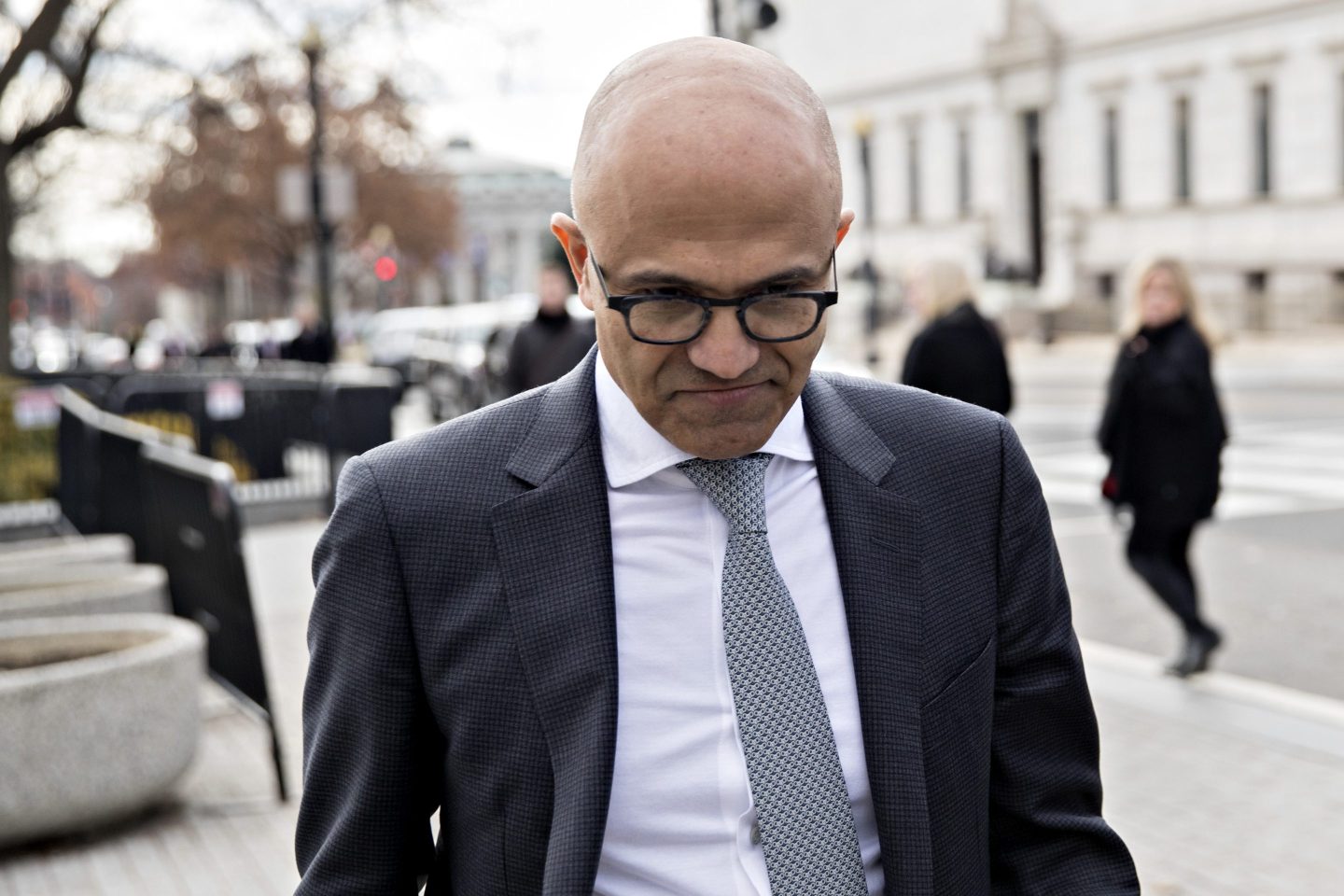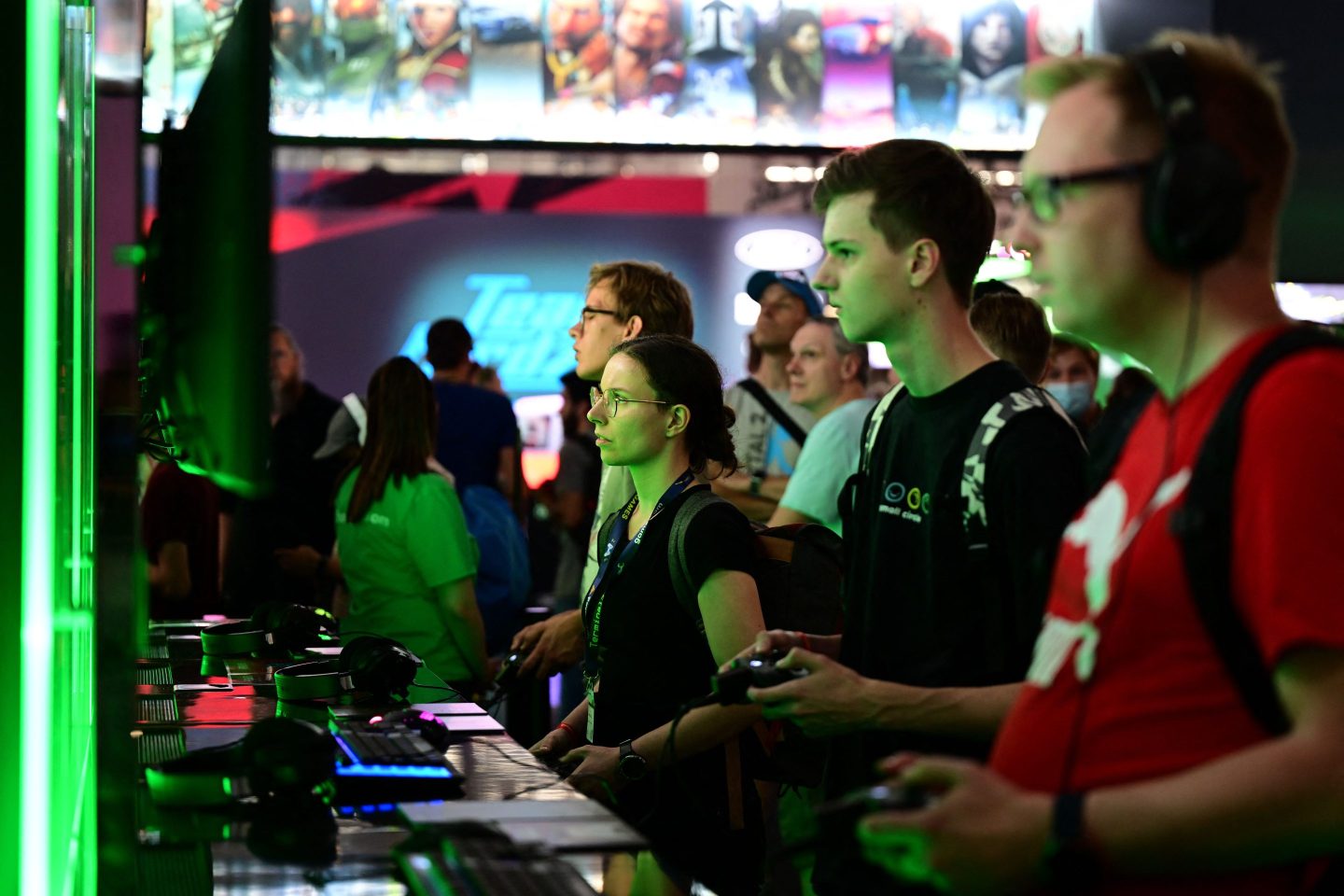
2022年1月,微软(Microsoft)宣布以690亿美元的价格收购视频游戏公司动视暴雪(Activision Blizzard),这一举动立即引起了科技行业的关注:作为微软近五十年历史上规模最大的一笔收购,这是其CEO萨蒂亚·纳德拉的一次大胆举措,目标直指沉浸式虚拟世界的未来计算。
该笔交易尚未结束,但在这18个月间,许多事情已经发生了变化。
一方面,所谓元宇宙的热度消散。Facebook母公司Meta在元宇宙这个概念上投下重注,但这笔投资似乎已经彻底失败,而随着微软在动荡的经济环境下裁员数千人,并计划削减成本,HoloLens增强现实头盔的未来也充满了不确定性。HoloLens是微软的一个雄心勃勃的项目,投入了大量资金,目的是打造一个进入美丽新数字世界的入口。
但下一个颠覆性技术并不是元宇宙,而是人工智能,人工智能令行业大为振奋,并且吸引了投资者的关注。而微软凭借与爆火的生成式人工智能ChatGPT和DALL-E的开发者OpenAI合作,以及在该公司的投资,在下一波科技浪潮中占据了巨大的优势。
这就产生了一个显而易见的问题:为什么微软仍试图收购动视暴雪?
英国和美国的反垄断监管部门均表示将阻止该笔交易,因此这个问题变得更加值得讨论。周三,微软对英国阻止该笔交易的做法提起诉讼,微软与美国联邦贸易委员会(FTC)的诉讼将于8月开始审理。微软当前是否应该发起这些战斗?为在这些战斗中取胜而投入资本和精力是否值得?这或许是微软放弃交易的一次绝佳机会,尽管“分手费”高达30亿美元?
这些问题的答案很简单,并且这个答案可以透露出纳德拉优先考虑的许多问题。微软无法承担不完成该笔交易需要付出的代价。为什么呢?因为微软需要玩家,这或许比游戏玩家对微软的需求更加强烈。
微软需要在游戏行业树立信誉
从经济值上来看,游戏业务从来都不是微软最大的业务:虽然微软并未公布游戏相关业务的具体收入,但其最近的营收报告显示,Xbox硬件收入下滑,Xbox内容和服务收入只有小幅上涨。但将经济价值放在一边,游戏业务其实是对微软的战略最重要的业务之一,而且该科技巨头迫切需要在这个领域获得一次胜利。
众所周知,十年来,微软的Xbox游戏机一直远远落后于索尼(Sony)的PlayStation。微软首席游戏官菲尔·斯宾塞在最近参加一个播客节目时也承认,目前Xbox没有任何实际方法,能够在游戏机销量方面超越任天堂(Nintendo)或索尼。

一个很重要的原因是游戏:索尼不断推出PlayStation独占游戏,例如《战神:诸神黄昏》(God of War: Ragnarok)和《地平线:西之绝境》(Horizon Forbidden West)等,但微软却鲜有佳作。
当然,微软确实有《极限竞速:地平线5》(Forza Horizon 5)这样的亮点,微软旗下的《我的世界》(Minecraft)依旧火爆。但《光环:无限》(Halo Infinite)等游戏的失败,却给公司蒙上了阴影。《光环:无限》本来有潜力成为大作,但在发布后其光芒迅速消散。最近,微软又遭遇了尴尬的状况,其投入大预算制作的Xbox独占游戏《红霞岛》(Redfall),遭到了一面倒的负面评价。
而且除了经久不衰的《我的世界》以外,更不必提微软在智能手机游戏领域基本毫无存在感。通过动视暴雪有利可图的《糖果传奇》(Candy Crush Saga)和《暗黑破坏神:不朽》(Diablo Immortal)等游戏,微软将立即跻身顶级手机游戏厂商之一。
在智能手机领域,微软还一直在大力投资Game Pass订阅服务,使用户在几乎任何支持网络浏览器的设备上,包括个人电脑、手机和平板电脑等,都能访问数量庞大且不断增多的Xbox游戏。增加动视暴雪的游戏可以促进该项业务的发展,并使微软的影响力拓展到核心游戏机市场以外。
虽然微软近期与其他平台所有者达成的协议,意味着你可以在任何平台上玩《使命召唤》(Call of Duty),但如果微软成功收购动视暴雪,未来动视暴雪的某些游戏将仅在Xbox上发行。
换言之,微软成功合并动视暴雪后,将帮助微软在当前的形势下,在视频游戏市场树立必要的信誉,并确保在Xbox游戏机业务低迷的情况下,微软依旧可以在游戏市场站稳脚跟。这很重要,因为游戏在微软的宏伟计划中扮演着关键角色。
对于微软而言,游戏业务不只是游戏
虽然个人电脑市场整体上持续下滑,但微软的Windows系统依旧是大部分资深游戏玩家的首选平台。由于微软自行开发手机操作系统以失败告终,因此在日益由苹果(Apple)iOS和谷歌安卓系统主导的手机领域,为了避免Windows系统被边缘化,游戏玩家成为关键。
收购动视暴雪是向市场发出信号,证明微软在严肃对待游戏业务。在微软的管理下,动视暴雪的重磅游戏可能会继续在PC端和Xbox等游戏机上发布,以确保该平台的活力。这是一笔巨额投资,而且由于法律和监管方面的障碍,这也是一笔痛苦的投资,但通过该笔交易,微软可以确保游戏玩家继续选择Windows系统,并从中受益。

该交易将帮助推动Windows业务的发展。最近的营收报告显示,Windows OEM(PC厂商在设备上预装Windows系统需要向微软支付的许可费)收入下跌28%,使微软的更个性化运算业务的整体收入下滑9%,只有133亿美元。微软要扭转这种局面,在很大程度上将取决于它能否利用Windows系统开发游戏市场。据普华永道(PwC)估计,游戏市场的规模到2026年将达到约3,210亿美元。
在PC行业有一句老话:人们为了生产力购买电脑,但会为了游戏升级电脑。游戏玩家通常更有可能在首选平台上购买软件,更有可能长期使用一个平台,并且更有可能是高参与度用户。
从中期来看,微软将Windows视为众多服务的入口,例如Microsoft 365生产力套装、必应(Bing)搜索引擎和Edge浏览器等。使用Windows系统的游戏玩家越多,微软提供这些服务的渠道就越广泛。从长远来看,微软必须有一批忠实用户,这对于微软至关重要,未来无论诞生什么新技术,这些忠实的用户都将给微软带来帮助。
微软收购动视暴雪还有对未来的考虑。虽然Meta的马克·扎克伯格似乎已经放弃对元宇宙的炒作,但要知道,纳德拉也曾经是这个概念的主要推动者之一。虽然完全实现《头号玩家》(Ready Player One)等书中预测的虚拟世界仍遥遥无期,但现在人们已经可以玩到《堡垒之夜》(Fortnite)或《Roblox》等在线视频游戏。
微软收购动视暴雪,将同时买下《战神》等游戏。该游戏是最早真正获得成功的虚拟世界之一,虽然距离这个虚拟世界的诞生已经过去了近二十年,但每个月依旧有约两百多万玩家登录。
这款游戏并不是纳德拉之前支持的商业化元宇宙。但如果纳德拉想要在用户尤其是年轻用户聚集的平台与他们接触,比如他们投入时间和金钱更多的虚拟世界,那么《战神》和动视暴雪的其他游戏就是很好的起点。(财富中文网)
译者:刘进龙
审校:汪皓
2022年1月,微软(Microsoft)宣布以690亿美元的价格收购视频游戏公司动视暴雪(Activision Blizzard),这一举动立即引起了科技行业的关注:作为微软近五十年历史上规模最大的一笔收购,这是其CEO萨蒂亚·纳德拉的一次大胆举措,目标直指沉浸式虚拟世界的未来计算。
该笔交易尚未结束,但在这18个月间,许多事情已经发生了变化。
一方面,所谓元宇宙的热度消散。Facebook母公司Meta在元宇宙这个概念上投下重注,但这笔投资似乎已经彻底失败,而随着微软在动荡的经济环境下裁员数千人,并计划削减成本,HoloLens增强现实头盔的未来也充满了不确定性。HoloLens是微软的一个雄心勃勃的项目,投入了大量资金,目的是打造一个进入美丽新数字世界的入口。
但下一个颠覆性技术并不是元宇宙,而是人工智能,人工智能令行业大为振奋,并且吸引了投资者的关注。而微软凭借与爆火的生成式人工智能ChatGPT和DALL-E的开发者OpenAI合作,以及在该公司的投资,在下一波科技浪潮中占据了巨大的优势。
这就产生了一个显而易见的问题:为什么微软仍试图收购动视暴雪?
英国和美国的反垄断监管部门均表示将阻止该笔交易,因此这个问题变得更加值得讨论。周三,微软对英国阻止该笔交易的做法提起诉讼,微软与美国联邦贸易委员会(FTC)的诉讼将于8月开始审理。微软当前是否应该发起这些战斗?为在这些战斗中取胜而投入资本和精力是否值得?这或许是微软放弃交易的一次绝佳机会,尽管“分手费”高达30亿美元?
这些问题的答案很简单,并且这个答案可以透露出纳德拉优先考虑的许多问题。微软无法承担不完成该笔交易需要付出的代价。为什么呢?因为微软需要玩家,这或许比游戏玩家对微软的需求更加强烈。
微软需要在游戏行业树立信誉
从经济值上来看,游戏业务从来都不是微软最大的业务:虽然微软并未公布游戏相关业务的具体收入,但其最近的营收报告显示,Xbox硬件收入下滑,Xbox内容和服务收入只有小幅上涨。但将经济价值放在一边,游戏业务其实是对微软的战略最重要的业务之一,而且该科技巨头迫切需要在这个领域获得一次胜利。
众所周知,十年来,微软的Xbox游戏机一直远远落后于索尼(Sony)的PlayStation。微软首席游戏官菲尔·斯宾塞在最近参加一个播客节目时也承认,目前Xbox没有任何实际方法,能够在游戏机销量方面超越任天堂(Nintendo)或索尼。
一个很重要的原因是游戏:索尼不断推出PlayStation独占游戏,例如《战神:诸神黄昏》(God of War: Ragnarok)和《地平线:西之绝境》(Horizon Forbidden West)等,但微软却鲜有佳作。
当然,微软确实有《极限竞速:地平线5》(Forza Horizon 5)这样的亮点,微软旗下的《我的世界》(Minecraft)依旧火爆。但《光环:无限》(Halo Infinite)等游戏的失败,却给公司蒙上了阴影。《光环:无限》本来有潜力成为大作,但在发布后其光芒迅速消散。最近,微软又遭遇了尴尬的状况,其投入大预算制作的Xbox独占游戏《红霞岛》(Redfall),遭到了一面倒的负面评价。
而且除了经久不衰的《我的世界》以外,更不必提微软在智能手机游戏领域基本毫无存在感。通过动视暴雪有利可图的《糖果传奇》(Candy Crush Saga)和《暗黑破坏神:不朽》(Diablo Immortal)等游戏,微软将立即跻身顶级手机游戏厂商之一。
在智能手机领域,微软还一直在大力投资Game Pass订阅服务,使用户在几乎任何支持网络浏览器的设备上,包括个人电脑、手机和平板电脑等,都能访问数量庞大且不断增多的Xbox游戏。增加动视暴雪的游戏可以促进该项业务的发展,并使微软的影响力拓展到核心游戏机市场以外。
虽然微软近期与其他平台所有者达成的协议,意味着你可以在任何平台上玩《使命召唤》(Call of Duty),但如果微软成功收购动视暴雪,未来动视暴雪的某些游戏将仅在Xbox上发行。
换言之,微软成功合并动视暴雪后,将帮助微软在当前的形势下,在视频游戏市场树立必要的信誉,并确保在Xbox游戏机业务低迷的情况下,微软依旧可以在游戏市场站稳脚跟。这很重要,因为游戏在微软的宏伟计划中扮演着关键角色。
对于微软而言,游戏业务不只是游戏
虽然个人电脑市场整体上持续下滑,但微软的Windows系统依旧是大部分资深游戏玩家的首选平台。由于微软自行开发手机操作系统以失败告终,因此在日益由苹果(Apple)iOS和谷歌安卓系统主导的手机领域,为了避免Windows系统被边缘化,游戏玩家成为关键。
收购动视暴雪是向市场发出信号,证明微软在严肃对待游戏业务。在微软的管理下,动视暴雪的重磅游戏可能会继续在PC端和Xbox等游戏机上发布,以确保该平台的活力。这是一笔巨额投资,而且由于法律和监管方面的障碍,这也是一笔痛苦的投资,但通过该笔交易,微软可以确保游戏玩家继续选择Windows系统,并从中受益。
该交易将帮助推动Windows业务的发展。最近的营收报告显示,Windows OEM(PC厂商在设备上预装Windows系统需要向微软支付的许可费)收入下跌28%,使微软的更个性化运算业务的整体收入下滑9%,只有133亿美元。微软要扭转这种局面,在很大程度上将取决于它能否利用Windows系统开发游戏市场。据普华永道(PwC)估计,游戏市场的规模到2026年将达到约3,210亿美元。
在PC行业有一句老话:人们为了生产力购买电脑,但会为了游戏升级电脑。游戏玩家通常更有可能在首选平台上购买软件,更有可能长期使用一个平台,并且更有可能是高参与度用户。
从中期来看,微软将Windows视为众多服务的入口,例如Microsoft 365生产力套装、必应(Bing)搜索引擎和Edge浏览器等。使用Windows系统的游戏玩家越多,微软提供这些服务的渠道就越广泛。从长远来看,微软必须有一批忠实用户,这对于微软至关重要,未来无论诞生什么新技术,这些忠实的用户都将给微软带来帮助。
微软收购动视暴雪还有对未来的考虑。虽然Meta的马克·扎克伯格似乎已经放弃对元宇宙的炒作,但要知道,纳德拉也曾经是这个概念的主要推动者之一。虽然完全实现《头号玩家》(Ready Player One)等书中预测的虚拟世界仍遥遥无期,但现在人们已经可以玩到《堡垒之夜》(Fortnite)或《Roblox》等在线视频游戏。
微软收购动视暴雪,将同时买下《战神》等游戏。该游戏是最早真正获得成功的虚拟世界之一,虽然距离这个虚拟世界的诞生已经过去了近二十年,但每个月依旧有约两百多万玩家登录。
这款游戏并不是纳德拉之前支持的商业化元宇宙。但如果纳德拉想要在用户尤其是年轻用户聚集的平台与他们接触,比如他们投入时间和金钱更多的虚拟世界,那么《战神》和动视暴雪的其他游戏就是很好的起点。(财富中文网)
译者:刘进龙
审校:汪皓
When Microsoft announced plans to buy video game company Activision Blizzard for $69 billion in January 2022, the tech industry snapped to attention: As the largest acquisition in Microsoft’s nearly five-decade history, the deal was a bold move by CEO Satya Nadella, pointing the way to a future of computing in immersive, virtual worlds.
The deal hasn’t closed yet, but a lot has changed in the intervening 18 months.
For one thing, the hype over the so-called metaverse has shriveled up and died. Facebook parent company Meta’s big bet on the concept looks like a flop and the future of Microsoft’s HoloLens augmented reality headset—the company’s very ambitious, very expensive bet to provide a portal into these brave new digital worlds—is uncertain, as Microsoft lays off thousands of workers and seeks to cut costs in an uncertain economy.
Instead of the metaverse, A.I. has emerged as the next game-changing technology, sucking up all the industry excitement and investment dollars. And, as it turns out, Microsoft is in a pretty good position for this next wave thanks to its partnership, and investment, in OpenAI, the maker of generative A.I. megahits ChatGPT and DALL-E.
All of this raises an obvious question: Why is Microsoft still trying to acquire Activision?
Given that antitrust regulators in Britain and the U.S. have stated their intentions to block the deal, the question is even more pertinent. On Wednesday, Microsoft filed a lawsuit to challenge UK’s effort to block the deal, and the company’s trial with the U.S. FTC is set to start in August. Is this the fight Microsoft should be waging at this time, and is it worth all the cost in capital and attention that will be required to win? Perhaps this is a golden opportunity, albeit one with a $3 billion breakup fee, for Microsoft to walk away?
The answer to all those questions is simple, and reveals much about Nadella’s priorities. Microsoft can’t afford not to go through with the deal. Why? Because Microsoft needs gamers—perhaps more than gamers need Microsoft.
Microsoft needs a shot of credibility
Dollar for dollar, gaming has never been Microsoft’s biggest business: While Microsoft doesn’t break out specific revenue figures for gaming-related businesses, its most recent earnings report showed Xbox hardware revenue slumping, even as Xbox content and services revenue posted a modest gain. Putting dollars and cents aside, though, gaming is lowkey one of the most important businesses to Microsoft’s strategy, and it’s an area in which the tech giant desperately needs a win.
It’s no secret that Microsoft’s Xbox console has lagged far behind Sony’s PlayStation for over a decade now. Microsoft chief gaming officer Phil Spencer himself acknowledged in a recent podcast appearance that there’s currently no realistic way for the Xbox to overtake Nintendo or Sony in terms of console sales.
Microsoft Chief Gaming Officer Phil Spencer。PATRICK T. FALLON/BLOOMBERG VIA GETTY IMAGES
A big part of the problem is the games: Where Sony has delivered hit after hit with PlayStation-exclusive titles like “God of War: Ragnarok” and “Horizon Forbidden West,” Microsoft has struggled.
Sure, there have been bright spots like “Forza Horizon 5” and the ongoing success of the Microsoft-owned “Minecraft.” But they’ve been overshadowed by failures like would-be blockbuster “Halo Infinite,” which saw its star fade quickly after a promising launch. More recently, Microsoft suffered the embarrassment of an outright hostile reception to big-budget Xbox-exclusive title “Redfall.”
And that’s not to mention that Microsoft has essentially no presence in smartphone gaming, apart from the ongoing success of “Minecraft.” Microsoft would instantly become a power player in mobile gaming, thanks to lucrative Activision Blizzard-published titles like “Candy Crush Saga” and “Diablo Immortal.”
Speaking of smartphones, Microsoft has also been investing heavily in its Game Pass subscription service, which allows users to stream a vast-and-growing selection of Xbox games to almost any device with a web browser, including PCs, phones, and tablets. Adding Activision Blizzard’s roster of games to that catalog would only boost that initiative, and thus Microsoft’s reach outside of the core console market.
Still, while the terms of Microsoft’s recent agreements with other platform holders means that you’ll be able to find “Call of Duty” elsewhere, you can expect that if the deal goes through, some future Activision Blizzard titles will only be available on Xbox.
In other words, successfully merging with Activision Blizzard would give Microsoft a shot of credibility in the video-game market at a time when it could really use some, and ensure that it retains a stronghold in the games market despite its Xbox console woes. That, in turn, is important because of the quietly critical role that gaming plays in Microsoft’s bigger picture.
For Microsoft, gaming is no game
Even as the overall PC market has continued to slump, Microsoft Windows has remained the platform of choice for a large portion of serious gamers. Given Microsoft’s well-documented failures to build out a mobile operating system of its very own, that makes gamers a crucial constituency in the company’s quest to make sure that Windows stays relevant in a world increasingly dominated by Apple iOS and Google Android.
Buying Activision Blizzard is a signal to that market that Microsoft takes gaming seriously. It’s likely that under Microsoft’s stewardship, major games from the publisher will continue to launch on PC alongside consoles like Xbox, ensuring that the platform stays vibrant. It’s a pricey investment, and a painful one given the legal and regulatory hassles, but Microsoft has a vested interest in making sure gamers continue to choose Windows.
And the Windows business could use the help. Per that most recent earnings statement, Windows OEM revenue — the licensing fees paid by PC manufacturers to Microsoft to pre-install Windows on their machines — dipped 28%, contributing to an overall 9% dip in Microsoft’s More Personal Computing business segment to $13.3 billion. If Microsoft has any hope of turning things around, it likely lies in large part by moving Windows to tap into the gaming market, which PwC estimates will be worth some $321 billion by 2026.
There’s an old adage in the PC industry: people buy computers for productivity, but they upgrade for games. Gamers are generally more likely to buy software on their platform of choice, more likely to stick with that platform over the long term, and more likely to be highly-engaged users.
In the medium term, Microsoft sees Windows as its gateway to services like the Microsoft 365 productivity suite, the Bing search engine, and the Edge browser. The more gamers tie themselves to Windows, the wider Microsoft’s funnel for those services becomes. In the longer run, Microsoft gets to build an important level of loyalty that may serve it well whatever comes next in tech.
There’s also a future-looking component to this investment, too. While even Meta’s Mark Zuckerberg seems to have backed down on the hype around the metaverse, it’s important to remember that Nadella is also a big booster of the concept. And while the fully-realized virtual world predicted by books like “Ready Player One” is still far off, online video games like “Fortnite” or “Roblox” are the closest things available today.
In buying Activision Blizzard, Microsoft is also buying games like “World of Warcraft” – one of the first truly successful virtual worlds, which almost two decades into its existence still sees an estimated two million-plus players log in every month.
The game isn’t quite the business-focused metaverse that Nadella has previously espoused. But if Nadella wants to meet users – particularly younger users – where they’re at as they spend more time and money in virtual worlds, “World of Warcraft” and Activision Blizzard’s other properties are a good start.






